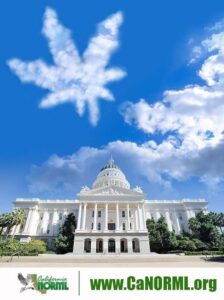UPDATE: THE LAW WILL TAKE EFFECT ON MARCH 1, 2020.
October 14, 2019 – Governor Newsom has signed SB 34 (Wiener), to exempt compassion programs that give away cannabis to needy patients from taxation. He also signed into law SB 223 (Hill) to allow parents to bring cannabis medicines to their children at school (if their school districts approve). Gov. Brown vetoed similar bills last year.
Newsom vetoed SB 305 (Hueso) which would have allowed terminally ill patients to use cannabis in certain health care facilities, citing federal conflicts in his veto message.
Cal NORML supported these bills, organizing citizen lobbyists for a lobby day in Sacramento in May and testifying at hearings on their behalf. NORML networks generated over 3,000 letters to lawmakers from their constituents in 2019.
Another bill Cal NORML lobbied for, AB1261 (Jones-Sawyer), to eliminate the state narcotics registry for drug offenders, was signed. Under past law, certain convicted drug offenders were required to register with their sheriff for five years after their release. Cal NORML supported AB 1261, since registry was required for marijuana cultivation and possession with intent to sell.
Newsom also signed a transportation omnibus bill that bans cannabis use in limos and on party buses, leaving in place exemptions only for alcohol. Separately, a bill that would have required ventilated driver compartments for vehicles taking customers on cannabis tours was tabled so legislators could work out conflicts and get more input from state agencies.
A bill to ban smoking and vaping on California beaches, the result of a decade of efforts that saw similar bills vetoed seven times by former Govs. Jerry Brown and Arnold Schwarzenegger, was signed by Newsom. People caught using cigarettes, cigars, pipes or electronic cigarettes will face a fine of up to $25 under the new law, which takes effect on January 1. The bill covers “any other weed or plant as an alternative or supplement to tobacco or nicotine” and has an exemption for “plant product used in connection with the good faith practice of a religious belief or ceremony.”
SB 153 to update California’s hemp cultivation laws in accord with the 2018 federal farm bill was signed, but a bill to regulate CBD additives in foods (AB-228) stalled in the legislature.
Other bills signed by Newsom before his October 13 deadline were:

